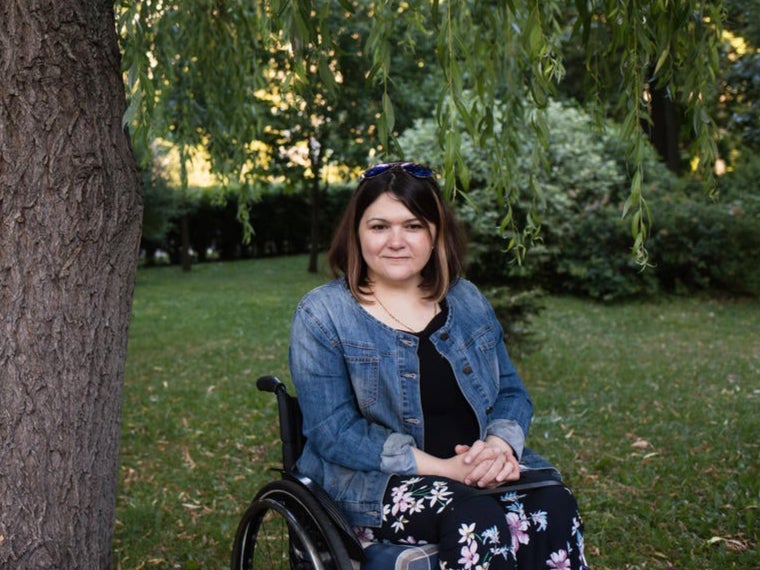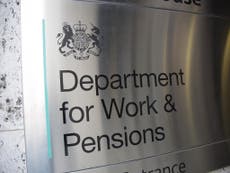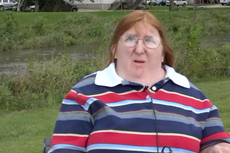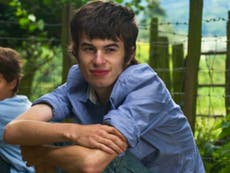We should advocate for those with disabilities during the pandemic and beyond
I escaped Ukrainian conflict while in a wheelchair and helped others with disabilities do the same, but coronavirus has brought a whole host of new challenges


Your support helps us to tell the story
From reproductive rights to climate change to Big Tech, The Independent is on the ground when the story is developing. Whether it's investigating the financials of Elon Musk's pro-Trump PAC or producing our latest documentary, 'The A Word', which shines a light on the American women fighting for reproductive rights, we know how important it is to parse out the facts from the messaging.
At such a critical moment in US history, we need reporters on the ground. Your donation allows us to keep sending journalists to speak to both sides of the story.
The Independent is trusted by Americans across the entire political spectrum. And unlike many other quality news outlets, we choose not to lock Americans out of our reporting and analysis with paywalls. We believe quality journalism should be available to everyone, paid for by those who can afford it.
Your support makes all the difference.It was a great honour to win the UNHCR Nansen Refugee Award for Europe this week, but my story begins when I was 10 years old.
That school day started like any other in my home city of Luhansk in eastern Ukraine. It was a gym class – pommel horse vaulting. I’d done it before. But that time was different. Something snapped. When I came to, I couldn’t walk. My life had changed forever.
For the next seven years, I barely left the house. I took all of my classes at home. I was confined to a wheelchair. It wasn’t easy, but I had a lot of support from my parents and classmates.
Above all, I was determined to seize life and live it to the fullest.
I started getting involved with rights for people with disabilities at 17. And in 2002, I set up Ami-Skhid, a non-governmental organisation to help young Ukrainians overcome disabilities. We conduct advocacy and provide services and counselling. Our main focus is on young people, women and families.
Over the years, Ami-Skhid has grown into a regional network of NGOs that has helped more than 10,000 people.
2014 was a turning point for so many people here, not least me and the organization. Conflict broke out in eastern Ukraine, my home region. Civilians were in danger and none more so than people with disabilities.
My husband Oleksiy Soroka also uses a wheelchair. Back then our son, Pavlo, was eight. I remember one time during an artillery attack Pavlo crying at the sound of the sirens. We were supposed to take shelter in the basement but, in our wheelchairs, we couldn’t descend. Pavlo refused to shelter without us.
Eventually, we escaped by road amid the fighting. I decided to set about helping organise evacuations for other people with disabilities, including by setting up a hotline to answer calls for people who were trapped by the conflict. Once people were able to re-emerge into the light, we were able to help around 5,000 people with cash, legal services and counselling as they sought to restart their lives.
Part of that involved setting up an online school using Skype for the many internally displaced children who were struggling to cope. Many teachers donated their time free. I was also able to teach, using my degrees in sociology and art.
The Ukraine government estimates that 1.6 million people have been displaced by the conflict. Many have disabilities. UNHCR, the UN Refugee Agency, is helping to provide assistance through its partner organisations.
To me, this whole period has been a revelation. It hasn’t been easy for any of the displaced but it has been especially hard for those with disabilities. Even so, I was able to use my own experiences to try to help others, and also to understand them.
There is still so much to do. I’m undertaking postgraduate research and earlier this year the government named me its commissioner for the rights of people with disabilities. At a recent Cabinet, I successfully argued that firefighters needed extra training to rescue people with disabilities during natural disasters. I also aim to make universities and other public buildings far more accessible to disabled people.
Covid-19 has of course presented new challenges to this work and we have had to become even more inventive. It isn’t easy for a young person with a disability, for example, to switch from face-to-face to online schooling. It was difficult for our family too. Even food shopping became harder as many supermarkets closed. Most of all, we missed seeing family and friends.
It is a great honour for me to be named this year’s European winner of the UNHCR Nansen Award. The award is in memory of Fridtjof Nansen, a Norwegian explorer, humanitarian and the first High Commissioner for Refugees, who was appointed by the League of Nations in 1921 – almost a century ago. The award aims to showcase his values of perseverance and commitment in the face of adversity, so of course I’m humbled to receive this accolade.
But this it isn’t about me. My life has been difficult in some ways, but I try my best. The Nansen Award gives me a greater opportunity to be heard. We should all do whatever we can to improve conditions for those who, through no fault of their own, have had their lives turned upside down, especially people living with disabilities.
Tetiana Barantsova is regional winner for Europe for the UNHCR Nansen Refugee Award for her work with people with disabilities and the displaced in Ukraine. The 46-year-old has used a wheelchair since a childhood accident



Join our commenting forum
Join thought-provoking conversations, follow other Independent readers and see their replies
Comments